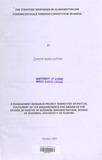| dc.contributor.author | Marete, Njoka C | |
| dc.date.accessioned | 2013-05-10T09:34:58Z | |
| dc.date.available | 2013-05-10T09:34:58Z | |
| dc.date.issued | 2007-10 | |
| dc.identifier.citation | Masters Of Business Administration (MBA) Degree, School Of Business, University of Nairobi | en |
| dc.identifier.uri | http://erepository.uonbi.ac.ke:8080/xmlui/handle/123456789/21223 | |
| dc.description | A management research project submitted in
partial fulfillment of the requirements for
the Masters Of Business Administration (MBA)
Degree, School Of Business, University of
Nairobi | en |
| dc.description.abstract | The business environment within which the manufacturing pharmaceutical
industry operates has been very volatile. The political anxiety, competition from
the entrants, social reforms, technological advancement and global changes are
some of the challenges that have greatly affected the growth of the industry.
The dynamism of the pharmaceutical environment in the current times is posing
a lot of challenges to all pharmaceutical companies. This study was designed to
investigate the strategic response to competition by GSK. The research design
was a case study and the population consisted of the 300 employees in GSK.The
study used a sample of 10 managers and forty other employees not in the
management team. This sample was selected using systematic random sampling
technique. Primary data was collected using questionnaires while secondary data
was collected from published records in the pharmaceutical industry. The
collected data was then analyzed using descriptive statistics such as mean and
percentages. The results were then presented in form of frequency tables.
The study found out that GSKis faced with a myriad of challenges but the most
pronounced challenge was competition. This competition was seen in terms of
supplies, the supply chain, marketing of products and selling to the final
consumer. The company has responded to the challenges of competition by
putting up production facilities in many countries across the world to be able to
compete effectively with others in the industry. The company also introduced a
management accounting system in all its divisions as a response to the kind of
accounting systems employed by other companies. The spate of mergers also
brought with it challenges that the company has had to deal with such as
integrating the separate identities, integrating different strategies and integrating
packaging and manufacturing operations of the other partners that formed the
merger. These findings have important implications to GSK, the pharmaceutical
industry and the policy makers in the pharmaceutical industry in Kenya. | en |
| dc.language.iso | en | en |
| dc.publisher | University of Nairobi | en |
| dc.title | The strategic responses of Glaxosmithkline pharmaceuticals towards competition in Kenya | en |
| dc.type | Thesis | en |
| local.publisher | School of Business | en |

